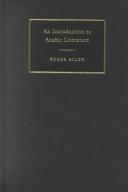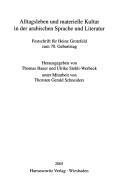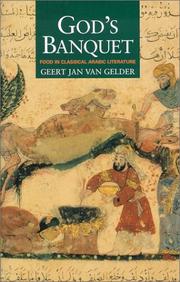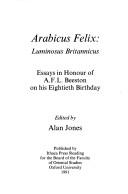| Listing 1 - 10 of 31 | << page >> |
Sort by
|
Book
ISBN: 208080118X 9782080801180 Year: 2005 Volume: 579 Publisher: Paris: Flammarion,
Abstract | Keywords | Export | Availability | Bookmark
 Loading...
Loading...Choose an application
- Reference Manager
- EndNote
- RefWorks (Direct export to RefWorks)

ISBN: 0521772303 0511800754 0511049757 051115111X 1280159049 0511310471 0511118414 1107119650 Year: 2000 Publisher: New York : Cambridge University Press,
Abstract | Keywords | Export | Availability | Bookmark
 Loading...
Loading...Choose an application
- Reference Manager
- EndNote
- RefWorks (Direct export to RefWorks)
Roger Allen provides a comprehensive introductory survey of literary texts in Arabic, from their unknown beginnings in the fifth century AD to the present. The volume focuses on the major genres of Arabic literature, dealing with Islam's sacred text, the Qur'an, and a wealth of poetry, narrative prose, drama and criticism. Allen reveals the continuities that link the creative output of the present day to the illustrious literary heritage of the past and incorporates an enormously rich body of popular literature typified most famously by The Arabian Nights. The volume is informed by Western critical approaches, but within each chapter the emphasis is on the texts themselves, with extensive quotations in English translation. Reference features include a chronology and a guide to further reading. A revised and abridged version of Allen's acclaimed study, The Arabic Literary Heritage, this book provides an invaluable student introduction to a major non-Western literary tradition.

ISBN: 3447050098 9783447050098 Year: 2005 Volume: 55/1 Publisher: Wiesbaden: Harrassowitz,
Abstract | Keywords | Export | Availability | Bookmark
 Loading...
Loading...Choose an application
- Reference Manager
- EndNote
- RefWorks (Direct export to RefWorks)
Arabic literature --- Arabic language --- History and criticism. --- Semantics --- History. --- Arabic literature - History and criticism. --- Arabic language - Semantics - History.
Book
ISSN: 01336193 01336193 ISBN: 9789637451232 9637451234 Year: 2013 Volume: 16 16 Publisher: Budapest: Magyar Tudományos Akadémia Könyvtára,
Abstract | Keywords | Export | Availability | Bookmark
 Loading...
Loading...Choose an application
- Reference Manager
- EndNote
- RefWorks (Direct export to RefWorks)
Book
ISSN: 12622850 ISBN: 9782745323538 2745323539 Year: 2012 Volume: 102 Publisher: Paris: Champion,
Abstract | Keywords | Export | Availability | Bookmark
 Loading...
Loading...Choose an application
- Reference Manager
- EndNote
- RefWorks (Direct export to RefWorks)
Ce travail interroge l’universalité du fantastique, tel qu’il est usuellement défini. Il le fait en considérant le fantastique selon deux contextes : un contexte occidental et un contexte auquel le fantastique est étranger, au moins en termes de définition et d’approches critiques, celui des littératures arabes. Les critiques arabes empruntent la terminologie critique occidentale mais ne revendiquent pas l’existence d’un genre fantastique. Au regard d’un corpus critique et littéraire occidental, le fantastique se caractérise par deux fonctions essentielles : il est le révélateur et le ressort de la pensée qui le fonde. Les nouvelles fantastiques d’Aymé, de Buzzati et de Pellerin montrent une articulation problématique du singulier et du commun qui défait la mécanique d’une pensée binaire ; en même temps, elles montrent la possibilité de résoudre les paradoxes de cette pensée par l’évocation d’un dehors indéterminé. Le contexte arabe, à travers les nouvelles de Tâmir, de Nasr et de Tûbyâ, et à travers les discours de la critique arabe contemporaine, suggère une réflexion sur les limites de certaines déterminations du fantastique occidental et conduit à envisager une pensée du fantastique qui propose une nouvelle articulation du singulier et du commun et permette de construire une configuration partagée de deux contextes littéraires, étrangers l’un à l’autre. Cela suppose que l’on lise l’imaginaire de ces écrivains arabes comme le dehors et comme l’interprétant du fantastique occidental, mais, par là-même, caractérisable sous le signe d’un universel.
Book
ISBN: 9004326723 9789004326729 9789004326705 9004326707 Year: 2017 Volume: 149 Publisher: Leiden, [Netherlands] ; Boston, [Massachusetts] : Brill,
Abstract | Keywords | Export | Availability | Bookmark
 Loading...
Loading...Choose an application
- Reference Manager
- EndNote
- RefWorks (Direct export to RefWorks)
Wissensvermittlung im Gespräch ist die erste Monographie über die Verwendung der Dialogform in der arabischen Literatur. Regula Forster untersucht dazu ein umfangreiches Korpus klassisch-arabischer Dialoge ganz unterschiedlichen Inhalts (Religion, Jurisprudenz, Alchemie, Geschichte et cetera) aus der Zeit zwischen dem 8. und der Mitte des 11. Jahrhunderts. Sie zeigt auf, dass arabische Dialoge nicht einfach als dialogisierte Abhandlungen zu verstehen sind. Vielmehr erschaffen Dialoge eigene literarische Universen, indem sie Figuren in Zeit und Raum agieren lassen und spezifische Formen der Argumentation und Textstrukturierung verwenden. Durch die spezifische literarische Form des wissensvermittelnden Dialogs wird auch der Inhalt der Texte gelenkt. This is the first book-length study about the usage of the form of literary dialogue in Arabic literature. Regula Forster studies an extensive corpus of Classical Arabic didactic dialogues on very different subjects (religion, jurisprudence, alchemy, history, et cetera) from the 8th to the mid-11th centuries. She shows that Arabic dialogues are by no means dialogised treatises. Rather, they create a literary universe of their own. In this universe, figures are shown to be acting and speaking in time and space. Therefore, the dialogues use specific forms of argumentation and structuring. Through the use of the literary form of dialogue the content of these texts is shaped and the knowledge presented channelled.

ISBN: 0231119488 9780231119481 Year: 2000 Publisher: New York: Columbia university press,
Abstract | Keywords | Export | Availability | Bookmark
 Loading...
Loading...Choose an application
- Reference Manager
- EndNote
- RefWorks (Direct export to RefWorks)
As essential ingredients of the good life, food and literature are intimately connected, and Arabic literature in particular is filled with references to food and wine. In "God's banquet", Geert Jan van Gelder explores the mainstays and byways of classical Arabic literature with wit and aplomb as he traces food's many manifestations in texts ranging from pre-Islamic poetry to the Koran, from the "Thousand and One Night" to social satires. "God's banquet" reveals that food may act as a marker of a multitude of things - time, place, class, status, nationality, ethnicity, religion, gender, character, and, of course, "taste" in several senses. Be it a metaphor, a symbol, a vehicle of allusion and insinuation or of praise and blame, food condenses the mores and social contours of an Arab ethos through the ages and reveals the treasures of this rich heritage.
Food in literature --- Gastronomy in literature --- Arabic literature --- History and criticism --- Arabic literature - History and criticism --- Littérature arabe --- Aliments --- Gastronomie --- Histoire et critique --- Dans la littérature

ISBN: 0863721451 9780863721458 Year: 1991 Volume: 11 Publisher: Reading, UK: Ithaca press,
Abstract | Keywords | Export | Availability | Bookmark
 Loading...
Loading...Choose an application
- Reference Manager
- EndNote
- RefWorks (Direct export to RefWorks)
Arabic philology --- Arabic literature --- History and criticism --- Islamic Empire --- History --- Arabic philology. --- History and criticism. --- History. --- Arabic literature - History and criticism --- Islamic Empire - History
Book
ISSN: 00393282 ISBN: 9789519380841 9519380841 Year: 2013 Volume: 114 Publisher: Helsinki: Finnish oriental society,
Abstract | Keywords | Export | Availability | Bookmark
 Loading...
Loading...Choose an application
- Reference Manager
- EndNote
- RefWorks (Direct export to RefWorks)

ISBN: 9780521772303 9780511800757 9780521776578 0521776570 0521772303 0511010745 0511118414 0511310471 1280159049 051115111X 0511049757 0511800754 1107119650 9780511010743 0511034512 9780511034510 9780511151118 9780511049750 9780511118418 Year: 2000 Publisher: Cambridge New York Melbourne Cambridge University Press
Abstract | Keywords | Export | Availability | Bookmark
 Loading...
Loading...Choose an application
- Reference Manager
- EndNote
- RefWorks (Direct export to RefWorks)
Roger Allen provides a comprehensive introductory survey of literary texts in Arabic, from their unknown beginnings in the fifth century AD to the present day. The volume focuses on the major genres of Arabic literature, dealing with Islam's sacred text, the Qur'an, and a wealth of poetry, narrative prose, drama and criticism. Allen reveals the continuities that link the creative output of the present day to the illustrious literary heritage of the past and incorporates an enormously rich body of popular literature typified most famously by The Arabian Nights. The volume is informed by Western critical approaches, but within each chapter the emphasis is on the texts themselves, with extensive quotations in English translation. Reference features include a chronology and a guide to further reading. A revised and abridged version of Allen's acclaimed study, The Arabic Literary Heritage, this book provides an invaluable student introduction to a major non-Western literary tradition.
| Listing 1 - 10 of 31 | << page >> |
Sort by
|

 Search
Search Feedback
Feedback About UniCat
About UniCat  Help
Help News
News